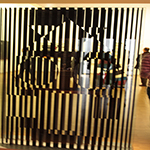Euroacademia Conferences
 Europe Inside-Out: Europe and Europeanness Exposed to Plural Observers (9th Edition) April 24 - 25, 2020
Europe Inside-Out: Europe and Europeanness Exposed to Plural Observers (9th Edition) April 24 - 25, 2020 Identities and Identifications: Politicized Uses of Collective Identities (9th Edition) June 12 - 13, 2020
Identities and Identifications: Politicized Uses of Collective Identities (9th Edition) June 12 - 13, 2020 8th Forum of Critical Studies: Asking Big Questions Again January 24 - 25, 2020
8th Forum of Critical Studies: Asking Big Questions Again January 24 - 25, 2020 Re-Inventing Eastern Europe (7th Edition) December 13 - 14, 2019
Re-Inventing Eastern Europe (7th Edition) December 13 - 14, 2019 The European Union and the Politicization of Europe (8th Edition) October 25 - 26, 2019
The European Union and the Politicization of Europe (8th Edition) October 25 - 26, 2019 Identities and Identifications: Politicized Uses of Collective Identities (8th Edition) June 28 - 29, 2019
Identities and Identifications: Politicized Uses of Collective Identities (8th Edition) June 28 - 29, 2019 The European Union and the Politicization of Europe (7th Edition) January 25 - 26, 2019
The European Union and the Politicization of Europe (7th Edition) January 25 - 26, 2019 7th Forum of Critical Studies: Asking Big Questions Again November 23 - 24, 2018
7th Forum of Critical Studies: Asking Big Questions Again November 23 - 24, 2018 Europe Inside-Out: Europe and Europeanness Exposed to Plural Observers (8th Edition) September 28 - 30, 2018
Europe Inside-Out: Europe and Europeanness Exposed to Plural Observers (8th Edition) September 28 - 30, 2018 Identities and Identifications: Politicized Uses of Collective Identities (7th Edition) June 14 - 15, 2018
Identities and Identifications: Politicized Uses of Collective Identities (7th Edition) June 14 - 15, 2018
“The Antichrist Lives in the West”: The United States and Western Europe as Russia’s Geopolitical “Other”
-
-

-
Presentation speakers
- Magda Dolinska-Rydzek, International Graduate Centre for the Study of Culture (GCSC) Justus-Liebig-Universität Gießen, Germany
Abstract:
The title of my presentation refers to the conception of neo-Eurasianism, established by Aleksander Dugin – Russian philosopher and political theoretician, a leader of the Center of Geopolitical Expertize in the Russian Duma. Dugin’s neoEurasianism is a re-interpretation of the conception, which was founded by Russian émigrés in France after the Bolshevik Revolution and gained popularity in the post-Soviet Russia. Euroasianism, together with conceptions of Westernizers and Slavophiles, are the most important philosophical interpretations of the “eternal” Russian queries about its place in the world, historical development and destiny – not only in political, but also metaphysical sense. Furthermore, all these conceptions derive from the most important question of the Russian self-knowledge: does Russia belong to the West or maybe is a distinct “civilization”? Although the dispute on this problem started in 19th century, it is still present in the public discourse of the contemporary Russia. In fact, after the fall of the Soviet Union, Russian political elites continuously attempt to “re-invent” Russia and establish its relationship with the West anew. Interestingly, the notion of the Antichrist plays an important role in many conceptions aiming at re-inventing the post-Soviet Russia. It appears not only in the Dugin’s neo-Eurasianism, but also in other political, historiosophical, and even scientific conceptions. Since the Antichrist has an idiosyncratic place in Russian culture and has been used in various context throughout the centuries, evoking this notion has a great impact on Russian society. Furthermore, the concept of the Antichrist has been predominately used in order to describe the “Other”, both internal and external. In consequence, the West, portrayed as the Antichrist, may be perceived not only as an ideological enemy, but also as the real political threat. In my presentation I would like to elaborate on how the notion of the Antichrist is used in Russian contemporary political and geopolitical discourse. Moreover, I would like to pay particular attention to the role of this concept in the processes of altering the West within “re-inventing” Russia after the fall of the Soviet Union.
-
Related Presentations

The Regional Cooperation Prospects of the Western Balkans: Can the EU’s Pre-Accession Conditionality Work Again?
- Julija Brsakoska Bazerkoska

















